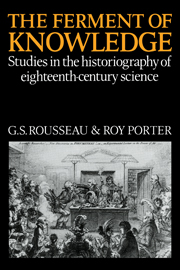6 - The living world
Published online by Cambridge University Press: 03 May 2010
Summary
It is somewhat difficult to describe and understand an intellectual revolution correctly when one has lived it day after day. Only by recalling how things were in the early 1950s may we take the measure of the change that has occurred in the last twenty-five years and has affected almost every field of research, including history in general and the history of science in particular.
We do not have to undertake such a general description here, and fortunately so: we must limit ourselves to the precise problems of the history of eighteenth-century life science. But because we are historians, we know how difficult it is to isolate a problem from its context and, as historians of science, we know that changes in our discipline are closely linked to the opinions prevailing in the philosophy of science and history. It will therefore be necessary to refer, even if briefly, to a more general situation if we want to understand what has happened in our field of inquiry. Eighteenth-century scientists, particularly naturalists, may be looked at in two different ways. If we read Charles Bonnet's observations of aphis parthenogenesis, Haller's experiments on muscular excitability, or Spallanzani's notes on artificial fertilization, we may be tempted to consider those scientists as the first ‘modern’ experimentalists. But if we think that they accepted the fantastic theory of the ‘pre-existing germs’, we cannot help considering them as ‘archaic’ thinkers.
- Type
- Chapter
- Information
- The Ferment of KnowledgeStudies in the Historiography of Eighteenth-Century Science, pp. 255 - 284Publisher: Cambridge University PressPrint publication year: 1980
- 17
- Cited by



